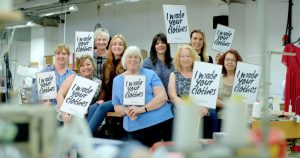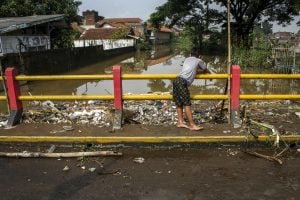On the eve of London Fashion Week, (17-21 Sept) a leading UK environmentalist and textile manufacture today calls on the fashion industry to stop polluting and take carbon off the catwalk.
CEO David Nieper Ltd, Christopher Nieper OBE said; “We are facing catastrophic climate change – fast fashion’s offshore manufacturing habit is a major contributor to the environmental crisis across the globe and is alone responsible for between 5-8% of global emissions every year.[1]
Yet, there is no clear plan from government on how to mitigate the damage being done by fashion and textiles in light of the UK’s net zero targets for 2050.
The majority of consumers care about the planet, and would choose responsibly produced garments given the choice. The fashion industry should come together and create a plan to clean up fashion by empowering consumer choice.
The UK is a world leader in fashion. London Fashion Week is itself influential and could be used as a platform to help bring about change. I’m dismayed to see that the UK’s ambitions to take a leading role in tackling climate change appear to exclude the fashion industry.
For fashion to ever be sustainable the whole system needs an overhaul, including the endless, complex supply chains. We need a step change in the way we source fashion and where it’s manufactured.”
Only a fraction of British designed fashion is actually made in Britain. UK fashion manufacturing only accounts for 3.3% value of total fashion industry in Britain. The total retail value of fashion and textiles in the UK is [2]£26billion, while the manufacture of clothes is worth £1.6 billion.
Similarly, while fashion is the UK’s largest creative industry supporting 800,000 jobs, only 26,900 [3] (just 3%) actually make clothes.
Christopher added: “Sustainable fashion needs sustainable manufacturing at its heart, and this can’t occur while the fashion industry does nothing to reduce carbon in clothes or take fossil fuels out of the supply chain.
Ultimately, the practice of offshoring fashion manufacturing essentially amounts to offshoring pollution. Two-thirds of emissions from UK clothing currently occur overseas, this is not acceptable – it cannot be out of sight, out of mind. It’s time to stop offshoring carbon emissions and start taking responsibility.”
In 2019 Christopher’s family business – David Nieper Ltd commissioned an academic study, which showed that a garment produced at the David Nieper factory in Derbyshire emits 47% LESS emissions than a similar garment produced overseas[4].
The report shows the biggest contributing factor to cleaner and more efficient manufacturing in the UK, is due to the lower carbon intensity of electricity supply network.
The UK has significantly lower carbon emissions per unit of electricity compared to overseas fashion production hubs such as China, Bangladesh and Turkey; therefore production in the UK has lower direct carbon emissions – making it a more sustainable manufacturing base.
The report also revealed that energy used in making clothes is dwarfed when compared to the energy used ‘upstream’ in the textile supply chain. Printing and dyeing fabrics accounts for over 70% of the total carbon emissions in garment production.
Following the report, the business has invested £4.5million in a new solar powered fabric print factory to re-shore its supply chain and bring textile manufacturing back to Britain. It is the biggest investment the company has made in sustainable production.
The new facility means that the fashion brand can now print and dye its’ own fabrics, making the entire production process sustainable and 100% traceable. Indeed, this year the majority of David Nieper’s collection will be printed and dyed in Derbyshire, using technology that helps mitigate environmental impact through significant water and energy savings.
Christopher added, “Manufacturing in Britain makes business accountable and allows control over each step of the production process. It also creates much-needed British jobs.
Greta is right – we are the custodians of our planet for future generations.
We can manufacture sustainably in this country and it makes commercial sense to do so.”
-ENDS-
For further information and interviews contact
David Nieper Press Office
07904 257687
Images:
- Christopher Nieper
- David Nieper Factory, Derbyshire
- Citarum River, Indonesia featured in BBC Documentary Fashion’s Dirty Secret. Environmental destruction of this area is attributed to local clothing factories which are linked to British high street chains.
[1] https://www.stand.earth/markets-vs-climate/fossil-free-fashion
[2] https://www.britishcouncil.org/research-policy-insight/insight-articles/power-fashion
[4] https://press.davidnieper.co.uk/academic-study-reveals-uk-manufacturing-is-47-greener/




